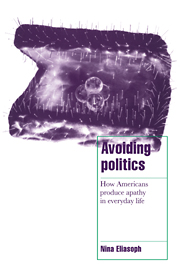Book contents
- Frontmatter
- Contents
- Acknowledgments
- 1 The mysterious shrinking circle of concern
- 2 Volunteers trying to make sense of the world
- 3 “Close to home” and “for the children”: trying really hard not to care
- 4 Humor, nostalgia, and commercial culture in the postmodern public sphere
- 5 Creating ignorance and memorizing facts: how Buffaloes understood politics
- 6 Strenuous disengagement and cynical chic solidarity
- 7 Activists carving out a place in the public sphere for discussion
- 8 Newspapers in the cycle of political evaporation
- 9 The evaporation of politics in the US public sphere
- Appendix 1 Class in the public sphere
- Appendix 2 Method
- Notes
- References
- Index
- Titles in the serious
9 - The evaporation of politics in the US public sphere
Published online by Cambridge University Press: 17 November 2009
- Frontmatter
- Contents
- Acknowledgments
- 1 The mysterious shrinking circle of concern
- 2 Volunteers trying to make sense of the world
- 3 “Close to home” and “for the children”: trying really hard not to care
- 4 Humor, nostalgia, and commercial culture in the postmodern public sphere
- 5 Creating ignorance and memorizing facts: how Buffaloes understood politics
- 6 Strenuous disengagement and cynical chic solidarity
- 7 Activists carving out a place in the public sphere for discussion
- 8 Newspapers in the cycle of political evaporation
- 9 The evaporation of politics in the US public sphere
- Appendix 1 Class in the public sphere
- Appendix 2 Method
- Notes
- References
- Index
- Titles in the serious
Summary
Examining everyday political conversation reveals an often ignored dimension of public engagement and disengagement, rebellion and acquiescence, curiosity and complacency. This seemingly shallow dimension is the intangible realm of unspoken political etiquette, where citizens delicately but very firmly establish a sense of what the public sphere itself is – of what can be questioned and discussed, where and how. In the contemporary American public sphere, paradoxically, what marks a context as clearly “public” is often precisely the fact that the talk there is so narrow, not at all publicminded. Civic etiquette made imaginative, open-minded, thoughtful conversation rare in public, frontstage settings. The more hidden the context, the more public-spirited conversation was possible. Politics evaporated from public circulation.
The people I met wanted to create a sense of community, but did not want to talk politics. Though they did gather together, they missed a chance to ignite that magical kind of power that can sparkle between people when they self-reflectively organize themselves. Such reflection does not necessarily entail ignoring local, individual suffering or abandoning local hands-on projects. In the process of alleviating real people's suffering, citizens could wonder aloud about the political forces that may have helped create that suffering. While building the playgrounds and selling tickets to the local Halloween fair, parents could casually talk about whatever came to mind, including politics. People could learn to use their collective imaginations to improve what they can improve – to lend a hand, but also an imagination.
- Type
- Chapter
- Information
- Avoiding PoliticsHow Americans Produce Apathy in Everyday Life, pp. 230 - 263Publisher: Cambridge University PressPrint publication year: 1998
- 2
- Cited by

